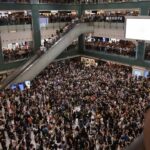Official data discloses the grim reality of New Zealand’s economy – it has tipped into recession. The driving force behind this downturn is a damaging cyclone that rocked the nation just before the upcoming national elections.
The country’s statistical agency, Stats NZ, revealed a contraction of 0.1% in the first quarter, following a 0.7% dip at the end of 2022. Finance Minister Grant Robertson acknowledged the recession, stating it was an anticipated event due to the slowing global growth, persistent high inflation, and the continual disruptions from weather events in North Island.
Extreme weather events, like the flooding in Auckland in January and the devastation from Cyclone Gabrielle in February, have imposed a significant burden on the economy. The government predicts clean-up costs from these events to reach up to NZ$15 million.
This marks New Zealand’s first economic decline since the COVID-19 pandemic in 2020, which led to border closures and affected export channels. With the economy shrinking, inflation escalating to 6.7%, and elections slated for October 14, the centre-right opposition was swift to point fingers at the government.
Also read: Thailand’s Foreign Ministry Assures Simple Visa Process for Chinese Tourists
Opposition finance spokesperson Nicola Willis cautioned that the economy was contracting while inflation continued to surge. Declines were reported across sectors, including agriculture, manufacturing, transport, and services.
With the impending election, polls suggest a tight race for the centre-left Labour government against the opposition National Party. Prime Minister Chris Hipkins faces mounting pressure to revitalize the shrinking economy. His planned trip to China, accounting for nearly a quarter of New Zealand’s export earnings, is expected to fortify trade relations.
Kiwibank’s chief economist, Jarrod Kerr, conveyed that the recession arrived earlier than expected. He warned of more contractions throughout the year. As New Zealanders grapple with a cost-of-living crisis, Kerr emphasized that the responsibility now lies with the Reserve Bank to mitigate the crisis by reversing the trend of rising interest rates.
Source: Malay Mail.
















